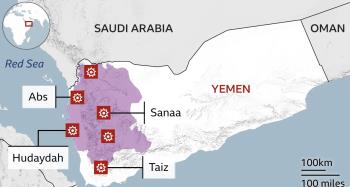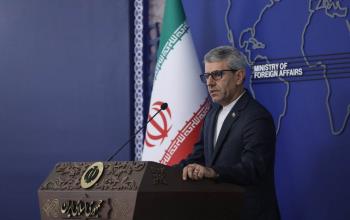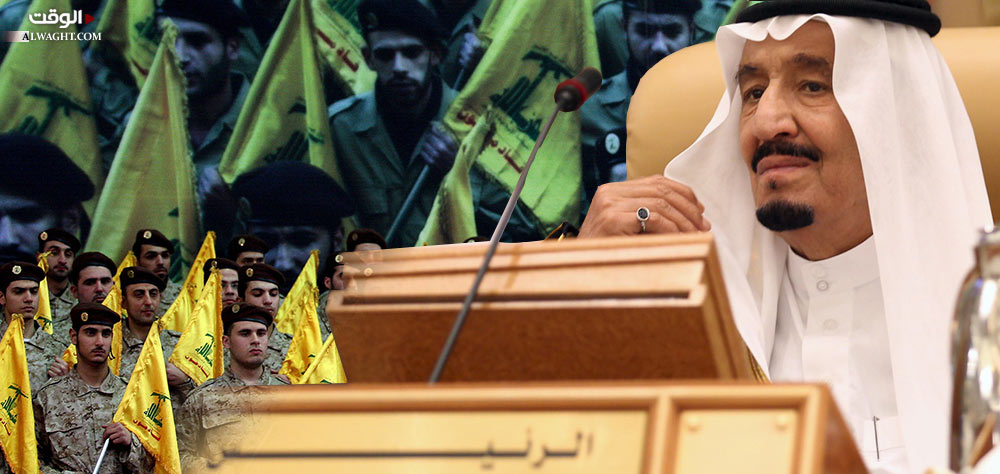Alwaght- Saudi Arabia has called for setting up of what it called an international coalition against Hezbollah, as the US is simultaneously imposing new sanctions on the resistant Lebanese group.
Thamer al-Sabhan, the Saudi minister of state for the Persian Gulf and Arab world affairs, in a Twitter post on October 8 praised the US fresh anti-Hezbollah sanctions as “good”, but added that the solution lied in a decisive international coalition to face the group and its supporters to help restore the security and peace to the region.
Saudi Arabian relations with Hezbollah have never been good, as Riyadh almost since the foundation of the Lebanese group in 1985 has adopted a hostile approach to it. The analysts argue that encouraging more sanctions on the one hand and calling for a global front against Hezbollah on the other hand are an evidence to the movement’s power and its significance to the Saudi rulers.
Hezbollah's Secretary General Sayyed Hassan Nasrallah in a latest speech referred to the al-Sabhan remarks about the necessity of a coalition to counter Hezbollah, saying that this was the Saudi admission to the regional power of Hezbollah.
Why has Riyadh welcomed the sanctions and called for more actions against Hezbollah?
Hezbollah’s influence inside Lebanon: Lebanon, a country grappling with internal political crisis for several years and also bordering the Israeli regime, occupies a very special position, something calling attention of a series of international and regional actors such as the US, Saudi Arabia, and also Iran. Being a strong Shiite organization, Hezbollah gained overwhelming popularity among the nation especially the youths especially after 2006 war against the Israeli regime during which Tel Aviv was dealt a hard blow by the movement’s fighters in an unequal battle. Hezbollah’s constructive policies at home also contributed to its domestic influence. In 2016, Hezbollah helped the country pick a president after two years of empty post as a result of a political standoff caused by discord between Western and Saudi-backed March 14 Alliance and the pro-resistance March 6 Alliance. Domestic influence and increasing popular trust in Hezbollah continue to underpin hostility by its foreign opponents who struggle to impair its social base, either through sanctions or an international coalition.
Hezbollah as exemplar of resistance for Arab world: Hezbollah’s successes, especially in confrontation of Tel Aviv, are not limited to the domestic stage. They go far beyond Lebanon to influence the Arab nations who are apparently made jubilant with its triumphs. Defeating the Israeli regime, a traditional enemy of the Arab states, sent a clear and inspiring message to the oppressed nations about possibility of standing against the cruelty and making it to victory. Beating Tel Aviv in the war expanded Hezbollah’s popularity because it alone could do a job that a coalition of Arab armies failed to do during years of struggle with the Israeli regime. The defeat, many admit, restored the Muslim world's pride and dignity. Accomplishment of the hard job presented a model of Hezbollah to the Islamic movements inside and outside the region. This is why Washington and Tel Aviv are seeking to curb increasing Hezbollah acceptance and reputation using the Saudi role in the region.
Hezbollah’s gains, Saudi policy’s losses: The regional states that are members of the Axis of Resistance in recent years have been suffering from foreign-imposed crises, including domestic conflicts and terrorism. Post-Saddam Iraq as well as Syria that hold an anti-Israeli agenda are two apparent examples. The forged crises in the two countries were mainly aimed at hitting the Resistance camp’s power. But the plan does not look going in favor of the plotters as despite inflammation of the crisis by a Western-Arab front, the Resistance camp has successfully weathered the troubles and now stronger than before is redesigning the region’s geopolitical map for its own interests. Also in Palestine case, Resistance’s attitude of confrontation of the Israeli occupation draws more popular support than the Arab countries' policy of compromise with Tel Aviv. The brutal Saudi war against the neighboring Yemen, now in its third year, as well as the pro-regime military intervention in Bahrain all vividly indicate Riyadh trepidation about expansion of the Resistance area of influence next to its borders.
Anti-Hezbollah stances serve Israeli-Western agenda: When the region was hit by resounding crises after the 2011 Arab uprisings, Saudi monarchy publicized its once-secret relations with Tel Aviv. Certainly, countering Hezbollah and demanding coalition against it is a crucial part of the Israeli-Saudi common interests. Saudi leaders seek West and Tel Aviv appeasement through two arrangements: Defiling the Palestinian cause by threatening Axis of Resistance and blacklisting Hezbollah as a terrorist group to degrade it socially for the final objective of downsizing Iran’s area of influence.
Despite all these struggles, Saudi aspiration to see Hezbollah impairment evidently goes nowhere. Two reasons frustrate Riyadh goals: First, Hezbollah is a deep-rooted actor on the Lebanese stage, with its power of political influence broadly perceived by all sides at home. And second, the Lebanese groups hold the vision that realization of anti-Hezbollah Saudi intentions strikes Lebanon’s unity and interests and is in best interest of Tel Aviv.



























